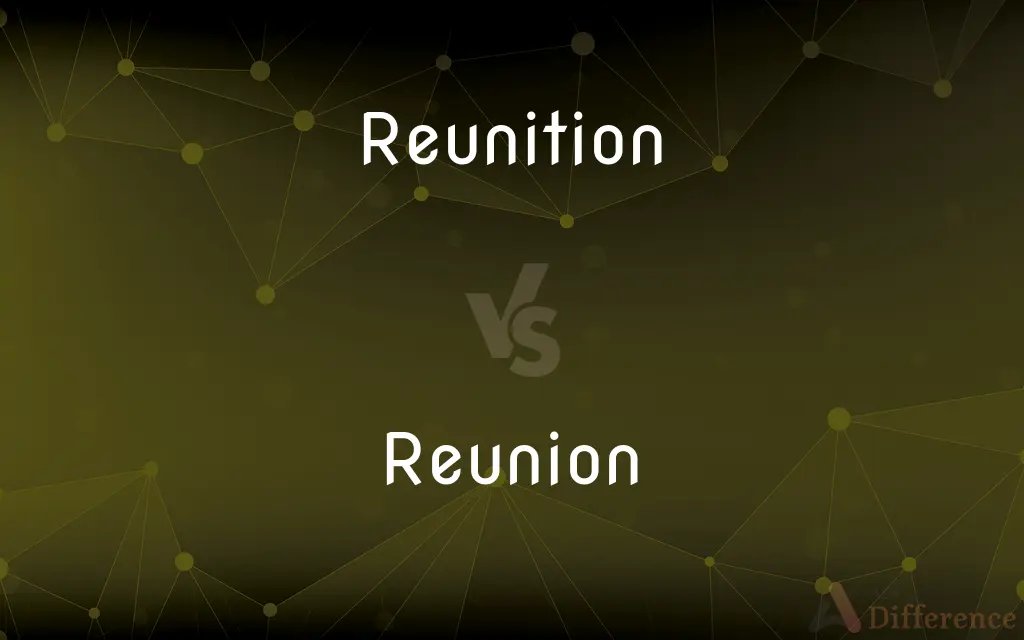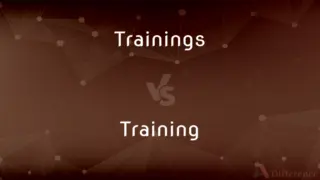Reunition vs. Reunion — What's the Difference?
By Urooj Arif & Maham Liaqat — Updated on May 9, 2024
Reunition is a rare or archaic term sometimes used synonymously with reunion, which refers to the act of reuniting or coming together again after separation.

Difference Between Reunition and Reunion
Table of Contents
ADVERTISEMENT
Key Differences
Reunition, though seldom used in modern English, suggests the act of uniting again or the state of being united again, much like its more common counterpart, reunion. Whereas reunion is widely recognized and used in both casual and formal contexts to describe gatherings of people who have been apart.
Reunition may appear in historical texts or in specific literary contexts, emphasizing a more archaic or formal tone. On the other hand, reunion is used universally across various media and conversations, denoting gatherings ranging from family members to school alumni.
The use of reunition can impart a sense of antiquity or formality to the discourse, which might be desirable in certain literary or rhetorical situations. Conversely, reunion carries a contemporary feel, suitable for most current-day communications.
Reunition, due to its rarity, might require clarification or even rephrasing in modern usage to ensure comprehension. In contrast, reunion is immediately understood without need for further explanation, making it more practical for everyday language.
While reunition might be chosen for stylistic reasons in certain writing or speech, reunion is the go-to term in event planning, social gatherings, and similar contexts where clarity and familiarity are paramount.
ADVERTISEMENT
Comparison Chart
Commonality
Rarely used, archaic
Commonly used, modern
Context of Use
Historical, literary
Everyday, formal and informal events
Connotation
Formal, possibly antiquated
Neutral, contemporary
Clarity in Modern Use
Might require explanation or rephrasing
Immediately understood
Purpose in Discourse
Stylistic choice for specific effect
Practical for clear communication
Compare with Definitions
Reunition
A coming together again after being apart.
Their reunition was as emotional as it was unexpected.
Reunion
A meeting after a period of separation.
Their reunion after decades apart was heartwarming.
Reunition
The act of uniting again after a separation.
The novel ends with a reunition of the long-lost siblings.
Reunion
A gathering of people who have been separated.
The family reunion became an annual tradition.
Reunition
A gathering or assembly after separation.
The club organized a reunition for former members.
Reunion
The act of coming together again.
The reunion of the old classmates was filled with laughter and memories.
Reunition
The state of being reunited.
The reunition of the divided community brought peace.
Reunion
An organized event where people reunite.
The school reunion was scheduled for June.
Reunition
An event or process of reuniting.
The reunition ceremony was held at the old family estate.
Reunion
The act of reuniting.
Reunition
An act of reuniting; a coming together again.
Reunion
The state of being reunited.
Reunition
A second uniting.
Reunion
A gathering of the members of a group who have been separated
A high school reunion.
Reunion
The process or act of reuniting.
The reunion took forever, but it was worth it.
It was a tearful and heartfelt reunion as the trapped miners finally saw their dear loved ones again.
Reunion
A planned event at which members of a dispersed group meet together.
Are you going to the high-school reunion this year?
Reunion
A second union; union formed anew after separation, secession, or discord; as, a reunion of parts or particles of matter; a reunion of parties or sects.
Reunion
An assembling of persons who have been separated, as of a family, or the members of a disbanded regiment; an assembly so composed.
Reunion
A party of former associates who have come together again
Reunion
The act of coming together again;
Monetary unification precipitated the reunification of the German state in October 1990
Common Curiosities
What is reunition?
Reunition refers to the act or process of uniting again, typically used in a more archaic or literary context.
How is reunition different from reunion?
Reunition is rarely used and may appear archaic, whereas reunion is widely recognized and used in everyday language.
In what context might one use reunition instead of reunion?
Reunition might be preferred in literary or historical writing to evoke a formal or old-fashioned tone.
Can reunition and reunion be used interchangeably?
While technically synonyms, reunition might confuse modern readers, making reunion the more practical choice for clear communication.
How do writers choose between reunition and reunion?
Writers may choose reunition to impart an old-fashioned or formal tone, especially in creative or thematic writing.
What is a reunion?
A reunion is a gathering or meeting of people who have been apart, commonly used in reference to social or family gatherings.
Is reunition a real word?
Yes, although it's very rare and considered archaic.
What type of events are typically called reunions?
Family gatherings, school alumni meetings, and similar events where people reunite after time apart.
Can reunition be used for events other than personal gatherings?
Theoretically yes, though its usage is so rare that it might not be recognized or understood in such contexts.
Are reunitions common in any particular culture?
Given its rarity, reunitions aren’t specifically common in any culture, unlike reunions.
Why is reunion preferred over reunition in modern English?
Reunion is easier to understand, more familiar, and fits better in contemporary discourse.
Is there a difference in the emotional connotation between reunition and reunion?
Reunition might convey a more formal or solemn tone, whereas reunion often carries a joyful and nostalgic connotation.
What is the etymology of reunition?
It derives from the same Latin root as reunion, both indicating the act of reuniting.
How does the frequency of use affect the understanding of reunition versus reunion?
The rare use of reunition means it might not be immediately recognized, unlike the universally understood reunion.
What advice would you give to someone using reunition in modern writing?
To ensure clarity, it might be beneficial to choose reunion or provide context for the use of reunition to avoid confusion.
Share Your Discovery

Previous Comparison
Trainings vs. Training
Next Comparison
Deli vs. ShopAuthor Spotlight
Written by
Urooj ArifUrooj is a skilled content writer at Ask Difference, known for her exceptional ability to simplify complex topics into engaging and informative content. With a passion for research and a flair for clear, concise writing, she consistently delivers articles that resonate with our diverse audience.
Co-written by
Maham Liaqat















































